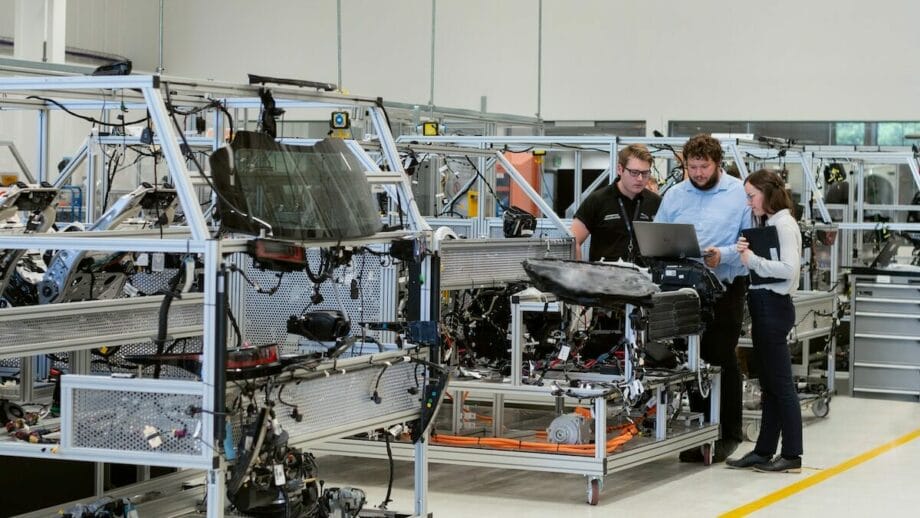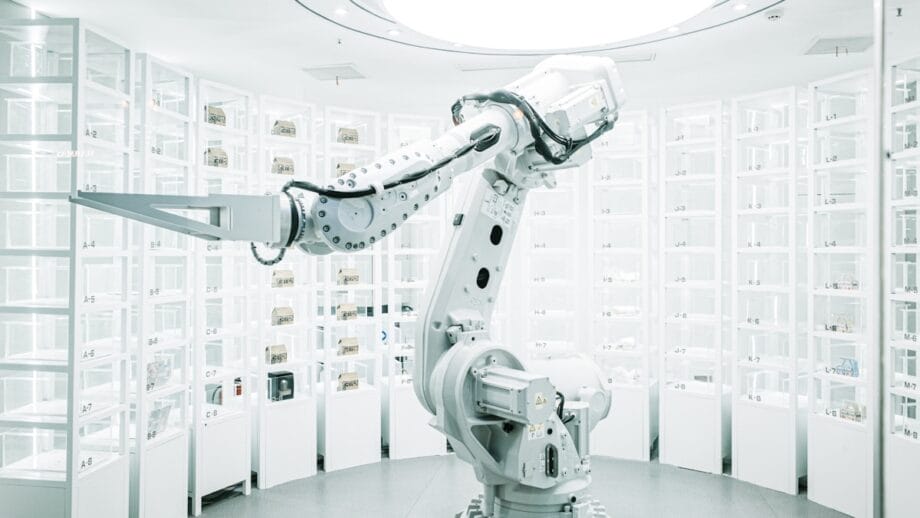For the manufacturing business, managing the various business functions and operations that are going on simultaneously can be a challenge, and managing the shop floor efficiently is very important. Many manufacturers face issues with handling work orders, tracking materials, checking quality, and making sure every job gets done right.
Shop floor ERP software helps connect these tasks and keeps everything organized in one system. It makes it easier to control each step, from starting a new job to checking finished products for quality. In this blog post, we look at how ERP can help simplify and improve shop floor processes from start to finish.
Making a Work Order: Creating Custom Work Orders

Whether your business deals with custom orders or orders that are made in batches, managing them properly is important. Each type of order needs specific details to be set up correctly. ERP systems help create clear and accurate work orders for all kinds of jobs, including make-to-order and discrete manufacturing.
And thus, using digital work orders in ERP avoids confusion from paper documents and allows real-time updates that everyone on the shop floor can see. This helps reduce errors, keeps workers informed, and ensures that every job starts with the right information for smooth production.
Planning Jobs and Resources in a Smarter, Not Harder Way
You need to take care of this aspect of business where you match jobs with the right machines, materials, and workers. It can be hard to plan everything manually and avoid conflicts or delays. The manufacturing ERP systems help by automatically scheduling jobs and assigning resources based on availability.
This reduces downtime by making sure machines and workers are used efficiently. The system also prevents double-booking and allows changes to the schedule when needed. This way, production keeps moving smoothly without unnecessary stops or confusion on the shop floor.
Tracking Materials and Linking Your Inventory
For your business to work and fulfill efficiently, you need to make sure that you are properly tracking, linking, and managing your raw materials and inventory for each job. ERP systems connect material availability directly to orders, so you always know what is on hand, and then they can automatically reorder materials when your stocks are low.
Here, the system also tracks lots and batches to help with quality and recalls if needed. This careful tracking prevents material shortages that can stop production, helping your shop floor run without delays or interruptions.
Sending Jobs to the Shop Floor
The manufacturing businesses can easily and effectively manage the way they send jobs to the shop floor using ERP systems. These systems provide simple dashboards and checklists that guide operators through each step of their work. Mobile access allows workers to get instructions anywhere.
Since here the ERP for the manufacturing system tracks job progress in real-time by recording operator sign-offs, machine data, and the time spent on tasks, if something goes wrong or a step takes too long, the system sends digital alerts quickly. This helps catch problems early and keeps production running on schedule without delays or mistakes.
Checking Quality During Production
This is highly important for your business, as it can dictate the quality of your products, which is required for branding and to make sure your customers stay satisfied. ERP systems include quality checks at key points during the production process. They capture data from inspections, measurements, and tests in real-time.
If any defect or problem is found, the system can automatically start corrective actions or follow nonconformance procedures, or notify the staff about it so proper actions can be taken. This helps fix issues quickly before they affect more products, reducing waste and ensuring consistent quality throughout the manufacturing process.

Collecting Data Automatically
For the very smooth functioning and management of your business, it is important to collect and store all production data for every order, batch, or serial number. ERP systems do this automatically, which helps keep accurate records without mistakes, and it is this traceability that makes it easy to handle compliance audits and product recalls when needed.
That’s why, by using barcodes, IoT devices, and operator inputs, the system reduces human error in data reporting, and having clear and reliable data helps your business stay organized, ensures product quality, and improves overall control of manufacturing operations.
Doing Final Quality Checks and Product Release
Before your products or packaging go out to customers or end users, it is highly important and required that they follow and provide high-quality products and meet all standards. ERP systems help manage the final quality checks by providing clear checklists and required documents for inspection.
So here, operators can easily complete and sign off on these checks within the system, which also makes sure nothing is missed before release. The ERP also collects feedback instantly, which helps improve processes over time, and this careful control at the end keeps your products reliable and your customers satisfied.
Learning from Shop Floor Information with Analytics and Continuous Feedback
If you want your business to grow and scale over the years, you need to gather, maintain, learn, and use the various data from your shop floor. ERP systems collect data on efficiency, waste, downtime, and quality trends during production. So that the managers, planners, and quality teams use these reports to understand what is working well and what needs improvement.
This step helps them make better decisions, reduce losses, and improve processes, as this continuous feedback from ERP analytics allows your business to optimize the shop floor and keep improving over time, leading to stronger performance and growth.
Tips for Using Manufacturing Shop Floor ERP
You can follow these easy and effective tips when using the best suitable manufacturing ERP solution for your specific business, so that you get to use all its effective features, and make the most of it all for your daily operations.
- Always keep data updated regularly: You need to always make sure all information in the ERP system is entered and updated on time. This helps avoid errors and keeps the entire shop floor informed.
- Effectively and properly train your staff: You should always provide clear and simple training for all workers using ERP. Well-trained staff can use the system correctly and help improve production.
- Efficiently use mobile access: It is best to enable mobile access for operators to receive real-time instructions and update job status from anywhere on the shop floor.
- Need to set clear quality checkpoints: You need to build and maintain quality checks at key steps in the production process to catch defects early and reduce waste.
- Regularly monitor inventory closely: Very regularly, you need to track raw materials and finished products closely in ERP to prevent shortages and delays in production.
- Properly review reports often: It is a good practice to look at ERP reports regularly to find issues like downtime or waste, and then you can use this data to improve shop floor efficiency.
- Update your scheduling plans quickly: You can use ERP to adjust job schedules immediately when there are changes in demand or resource availability to keep production smooth, so that you can make sure your business functions smoothly.
FAQs

1. How does ERP help create custom work orders?
ERP allows users to set up detailed, precise orders for custom jobs, including materials and steps, helping avoid errors and confusion on the floor.
2. Can ERP schedule jobs automatically?
Yes, ERP software can assign jobs to available machines and workers, reducing downtime and avoiding double-booking by adjusting schedules dynamically.
3. What role does ERP play in shop floor dispatch?
ERP provides clear instructions and real-time updates to operators, guiding each job step and tracking progress through digital checklists and alerts.
4. What is traceability in ERP, and why is it important?
Traceability means recording production details for every batch or item. ERP makes audits and recalls easier by keeping accurate, detailed records.
5. Can ERP collect production data automatically?
Yes, ERP uses barcodes, IoT devices, and operator inputs to automatically record data, lowering errors and improving reporting accuracy.
Conclusion

Using ERP on the shop floor helps manage every step from creating work orders to final quality checks. It keeps all tasks organized and connects important information in one place. This reduces errors, saves time, and improves the quality of products. Your manufacturing ERP also helps track materials, schedule jobs, and collect data automatically. By using ERP fully, manufacturers can increase efficiency and deliver better products to their customers consistently, because it is a smart way to improve their manufacturing process.






